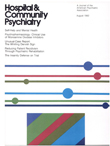The Therapeutic Community: A Critical Reappraisal
Abstract
Any new concept or movement can be understood only when considered in light of the sociopolitical context in which it emerges. The authors critically assess the concept of the therapeutic community in such terms. They assert that the therapeutic community should be viewed as a protest movement itself, or as part of a greater protest against the dehumanizing conditions of mental hospitals in the early 20th century. As a protest movement it has achieved significant success. However, the authors say, its therapeutic value has yet to be conclusively demonstrated and its practicability is also highly questionable. The authors suggest that the therapeutic community should be reassersed in light of changed social conditions, and a new and more pragmatic approach to organizing psychiatric hospitals be formulated.
Access content
To read the fulltext, please use one of the options below to sign in or purchase access.- Personal login
- Institutional Login
- Sign in via OpenAthens
- Register for access
-
Please login/register if you wish to pair your device and check access availability.
Not a subscriber?
PsychiatryOnline subscription options offer access to the DSM-5 library, books, journals, CME, and patient resources. This all-in-one virtual library provides psychiatrists and mental health professionals with key resources for diagnosis, treatment, research, and professional development.
Need more help? PsychiatryOnline Customer Service may be reached by emailing [email protected] or by calling 800-368-5777 (in the U.S.) or 703-907-7322 (outside the U.S.).



